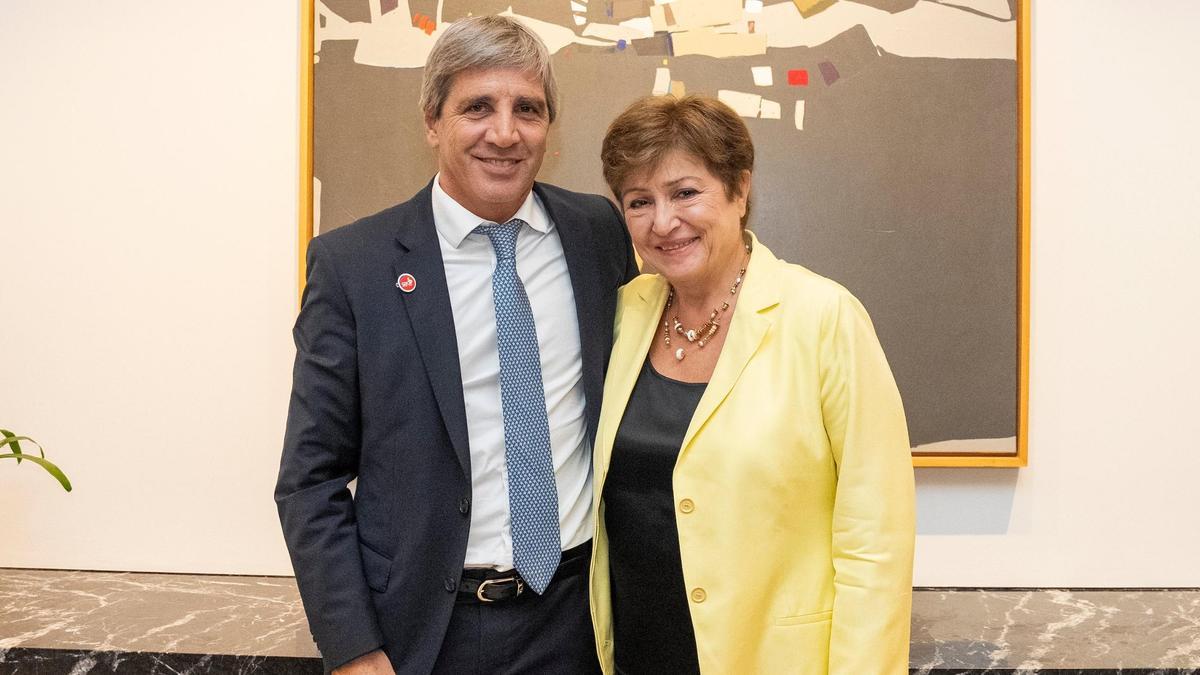
The Minister of Economy, Luis Caputo, returned to the country this Wednesday to hold a meeting with the technical team of the International Monetary Fund (IMF), as Kristalina Georgieva had anticipated last Sunday after her meeting with Javier Milei in the US. The Executive aims to obtain financing of at least US$11,000 million with the objective of sustaining the backwardness of the dollar and trying to lift the exchange rate.
Money laundering allowed Milei to reduce the exchange gap with parallel dollars and use the price of the currency as an anchor to lower inflation. The problem is that the Central Bank’s reserves remain negative and the exchange rate scheme used favors their continued fall since it stimulates imports and consumption abroad. To face the maturities of the external debt and avoid devaluation (pressing inflation upwards), the Government is looking for new credit that will allow it to reach the October elections without too many surprises.
The priority of a new agreement with the international organization was reconfirmed by Caputo who published on his X account: “Already in Buenos Aires. Excellent trip to Washington. I could not accompany the President to Davos because it will be three days of a lot of work mission of the Fund, the tender for accession announced yesterday, and measures that we are finishing designing from the Ministry of Commerce”.
The weak foundations of the backward dollar
Differences over monetary policy are at the center of the negotiations, the IMF seeks for Argentina to dismantle the stocks and unify exchange rates. On this point, the Argentine Government agrees, but the discussion revolves around the timing and the way to carry it out. There is also the debate about whether the current exchange rate is balanced, an aspect that the multilateral organization has been questioning.
The Fund has been issuing warnings, in the recent report on the agreement that is still in force they state: “To pave the way towards the recovery of market access, it will be necessary to adopt a credible strategy to dismantle exchange controls, greater exchange flexibility and a more significant role for monetary policy.”
From the ruling party they argue that the reduction of the gap between the official and financial dollars implied that it is not behind, but those dollars are not free, they are intervened directly by the Central Bank, indirectly by the “blend” offered to agro-exporters (possibility of liquidating 20% of the currencies in the parallel market) and are sustained largely by the “carry trade” (profits obtained by large businessmen thanks to the interest rate in pesos higher than the devaluation of the official quote). Economist Juan Graña published data in his X account showing that the current account of the BCRA’s exchange balance has been negative since June; That is to say, the export surplus is not enough to pay the growing deficit due to the payment of services (including tourist trips and purchases abroad) and imports.
The exchange rate lag is showing more and more cracks. In recent weeks, a strong intervention has been observed by the Central Bank of the Argentine Republic (BCRA) in the financial market with the aim of containing the rise of financial dollars such as the MEP and cash with settlement (CCL), and thus avoid an increase in exchange gaps. Last week, reserves fell by US$524 million, despite the fact that the entity reported net purchases of US$639 million and without recording relevant debt payments in the period.
Facing the adjustment of Milei and the IMF
With his usual denigrating style, Milei intervened in the discussion calling “moronics” those who demand that he eliminate exchange controls, when interviewed by Bloomberg this Wednesday prior to the Davos forum (an event that brings together leaders every year. politicians and CEOs of the planet in Switzerland). “We are committed to removing capital controls and the stocks, which are a tool of expropriation by the public sector,” the president stated bluntly and added that to eliminate the exchange rate, in addition to lowering inflation, he needs external funds. : “If we get financing, the exit is faster,” he declared.
Beyond the more immediate issues regarding exchange rate policy and reserve accumulation, the Fund continues to maintain its historical proposals in exchange for disbursements. “Structural reforms” that increase labor flexibility and benefits for large companies. Although Milei has taken measures in this regard, from the Base Law and the RIGI to the adjustment itself considered by Georgieva, the big vultures always ask for more. The objective is to increase the looting of the country, which will improve the profits of the business class but also the funds that are destined to pay the fraudulent foreign debt.
As the revolts against IMF adjustment plans around the world show, imperialism pushes millions into misery, while multiplying struggles against its objectives. It is key to recover the unions to put an end to the truce of the union bureaucracy and build a path of struggle that leads to the general strike until defeating the adjustment plan of the national government and the International Monetary Fund.
Source: www.laizquierdadiario.com

